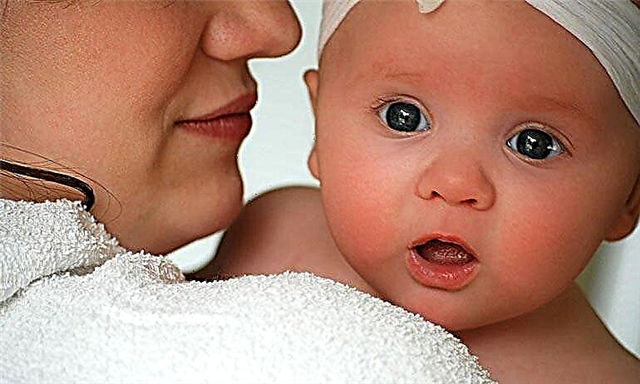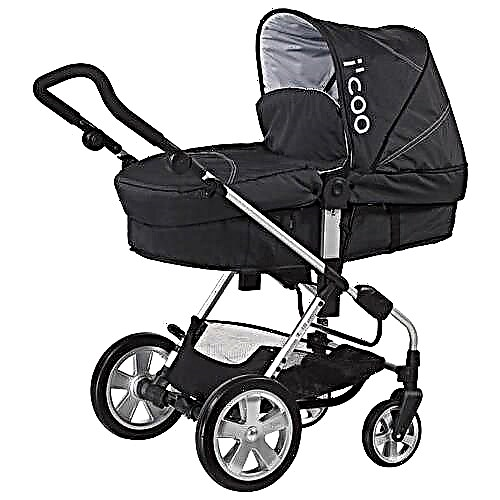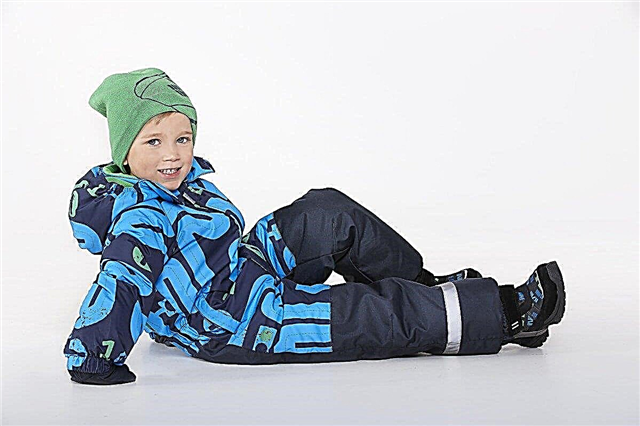As you know, babies do not know how to talk and cannot say that they are in pain. Therefore, parents have to closely monitor the slightest changes in the behavior of their baby in order to understand that something is bothering him. Even if the child is capricious and shows in every possible way that he is uncomfortable, it is often very difficult to understand whether the child has a prick in the bottom, a headache, or he just wanted to eat.

Sometimes there are no external manifestations of pain in infants.
How to diagnose pain in infants
If the baby has already learned to speak and understand his mom and dad, he will be able to say or show where he hurts. If we are talking about an infant, then you will have to focus only on the behavior of the child and the nature of his cry. For example:
- prolonged crying indicates a headache, which will not be possible to calm;
- Harsh screaming and loud roaring immediately after feeding are more likely to indicate abdominal pain or colic;
- if the baby cries and refuses to eat, it is worth looking into his mouth - perhaps he has thrush or stomatitis, and it simply hurts him to suck;
- shrill screams often indicate otitis media.
Symptoms of pain in the butt
Most often, pain in the anus in a child who cannot yet speak is difficult to diagnose. He can cry both with migraines and with abdominal pain. Depending on the cause, pain syndrome may be accompanied by additional symptoms such as diarrhea, constipation, redness in the anus, fever, or general weakness.

You need to carefully monitor the child's behavior in order to understand that something hurts him
Important! At the first suspicion of pain in the butt of an infant, it is strongly recommended to show it to a specialist. He examines the little patient and prescribes adequate treatment.
Why can the butt hurt
All the prerequisites for which the child's bottom hurts inside can be divided into several large groups:
- digestive problems;
- mechanical damage;
- invasion of worms;
- infectious and inflammatory diseases.
Constipation
Constipation is a common cause of pain. To diagnose it, you need to pay attention to the regularity of the baby's stool. Like diarrhea, constipation is a sign of problems with the baby's digestive system. A problem arises most often when a child is transferred from breastfeeding to artificial nutrition, with too fatty milk or relatively aggressive artificial nutrition, with which the infant's fragile intestines cannot cope.
Worms
Often the child complains of pain in the butt due to worms. In this case, the painful sensations are complemented by constant severe itching in the anus. In the case of babies, most often we are talking about pinworm infection. Despite the fact that these parasites are very small, they attack painfully. In some cases, itching extends to the genitals. Diagnosis of the presence of worms is made by performing a fecal test or a general blood test.
Trauma
Sometimes a small child has a pain in his butt due to an injury. If we are talking about a bruise, it is characterized by acute pain that is not felt at rest. With cracks or ruptures, the pain syndrome is much more intense and pronounced. It is absolutely impossible to confuse a fracture of the pelvic bones with anything else - this happens extremely rarely, but if it happens, the sick baby can only be in one position.
Allergy
An infant's butt can become sore due to an allergic reaction. The problem is usually accompanied by the following symptoms: the buttocks turn red or stained, urticaria appears, a runny nose develops, breathing becomes difficult, in some cases diarrhea begins. There will be no concomitant symptoms only if the allergic reaction has occurred inside the rectum. However, even then, by the atypical behavior of the baby, it will be possible to understand that something is wrong with him.
Paraproctitis
If the reason why the child begins to complain of pain in the anus is paraproctitis (inflammation of the fatty tissue in the pelvic region), you cannot do without the help of a qualified specialist. If the disease is not treated, the inflammatory process will spread to the nerve endings. In especially advanced cases, the formation of a purulent abscess is likely, which is fraught with serious problems.
Infections
Itching and pain in the anal area indicate the development of an infection. If a child has colitis in the bottom and itches more strongly after a bowel movement, then most likely it is a fungus. As a rule, fungal lesions do not belong to separate diseases, but are a symptom of an existing pathology, for example, diabetes or dysbiosis. In most cases, you can diagnose a fungal infection yourself. All you have to do for this is to examine the baby's anus. The fungus outwardly looks like a change in the skin, which is characterized by well-defined edges.

Cheerful baby - healthy baby
In addition to the above, inflammation of the mucous membrane can provoke pain. In such a case, its shell swells, turns red and becomes covered with a rash. Do not forget about such probable problems and pathologies as anal fissures, inflammation of the sphincter, hemorrhoids, fistulas, thrombophlebitis.
A fistula formed in the anus can hurt. Moreover, it can be both outside and inside. If you press on the anus, pus is likely to appear. Only now it is not recommended to do this, since the child will be very painful. Better to just show the baby to the doctor.

All parents are concerned about the health of their children
Important! Sometimes young children who have already begun to speak incorrectly describe the discomfort they feel. They claim that their butt hurts, but in fact their feelings are far from painful. We are talking about the so-called children's misinformation. So, if the baby complains of pain in the butt, you should not immediately panic. It is better to ask the child how it hurts and in what place, only then take some steps.
Should I see a doctor
A child's complaint that his butt hurts from the inside, even if it is expressed not in words, but in behavior (for example, tears, lack of appetite or general anxiety) is in itself a reason to see a doctor. Even behind the most vague and subtle symptoms, a dangerous pathology can be hidden. So that parents do not have to guess in the foreseeable future why they were not worried earlier, it is better to play it safe and show the baby to the pediatrician.
Even if the child's discomfort appears only during defecation, it will not be superfluous to conduct an examination, including not only an external examination, but also instrumental and laboratory diagnostics.
You shouldn't hesitate a minute if your baby has at least one of the following symptoms:
- the presence of blood clots in the feces;
- constant or paroxysmal pain sensations inside the priests;
- diarrhea or constipation does not go away for more than a day;
- the baby's body temperature rises;
- in addition to the priests, the stomach also hurts.

Do not be afraid to show your baby to the doctor
Prevention of itching and burning
Why injure a baby with painful treatment, if in most cases pain and burning in the pope can be avoided, if you regularly carry out preventive measures:
- use high-quality baby hygiene products that do not contain chemicals;
- regularly change diapers for a child;
- carry out water and air procedures daily;
- wash your baby's hands with soap or antiseptic;
- make sure that the child does not put toys or unwashed fruits and vegetables in his mouth.
Most diseases, including those whose symptoms are pain and itching in the anus, are a consequence of weakened immunity, improperly composed diet and diet, as well as stressful situations.
To reduce the likelihood of a problem to a possible minimum, the baby should be hardened from an early age, doing gymnastics with him. It is equally important to avoid hypothermia and overheating. Children should choose clothes from reliable manufacturers from environmentally friendly fabrics.
If there are pets in the apartment, tests in order to control the appearance of parasites in infants should be taken at intervals of at least once during a quarter.
The painful sensations of a child should under no circumstances go unnoticed. The first thing that any caring parent should do is to reassure their child, a positive attitude of a little patient is half the battle, regardless of what disease he is diagnosed with.



